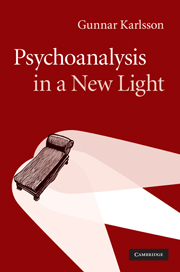Book contents
- Frontmatter
- Contents
- Preface
- Acknowledgements
- List of figures
- 1 Phenomenology and psychoanalysis
- 2 The life-world as the ground for sciences
- 3 A critical examination of neuropsychoanalysis
- 4 The conceptualization of the psychical in psychoanalysis
- 5 The libido as the core of the unconscious
- 6 The grounding of libido in the life-world experience
- 7 Beyond the pleasure principle: the affirmation of existence
- 8 The question of truth claims in psychoanalysis
- Concluding remarks
- References
- Index
Concluding remarks
Published online by Cambridge University Press: 05 June 2012
- Frontmatter
- Contents
- Preface
- Acknowledgements
- List of figures
- 1 Phenomenology and psychoanalysis
- 2 The life-world as the ground for sciences
- 3 A critical examination of neuropsychoanalysis
- 4 The conceptualization of the psychical in psychoanalysis
- 5 The libido as the core of the unconscious
- 6 The grounding of libido in the life-world experience
- 7 Beyond the pleasure principle: the affirmation of existence
- 8 The question of truth claims in psychoanalysis
- Concluding remarks
- References
- Index
Summary
The purpose of this work has been to discuss the domain and conditions of psychoanalysis. Phenomenological reflections and ideas have been of help, and phenomenological conceptions, such as life-world experiences and the intentionality of consciousness have played an important role in this book.
In chapters 2 and 3 we have the phenomenological view of the life-world, scientific activity and intentionality of consciousness that amounts to the claim that recent attempts to build a so-called ‘neuropsychoanalysis’ are revealed as unfounded.
Consciousness cannot be neglected in either the psychoanalytic investigation or the attempts to understand theoretically the essential character of psychoanalysis. I argued that consciousness has an epistemological priority in relation to the unconscious. This is an idea that, at least implicitly, is found among many psychoanalysts, including Freud, who admitted, among other things, that: ‘Now all our knowledge is invariably bound up with consciousness. We can come to know even the Ucs. only by making it conscious’ (Freud 1923: 19). One could also express it in the way that the unconscious can only be understood from the vantage point of consciousness and its intentional character. However, the epistemological priority of consciousness in relation to the unconscious does not mean that the unconscious is similar to consciousness. The difference between consciousness and the unconscious has, quite to the contrary, been thoroughly stressed.
- Type
- Chapter
- Information
- Psychoanalysis in a New Light , pp. 191 - 193Publisher: Cambridge University PressPrint publication year: 2010



